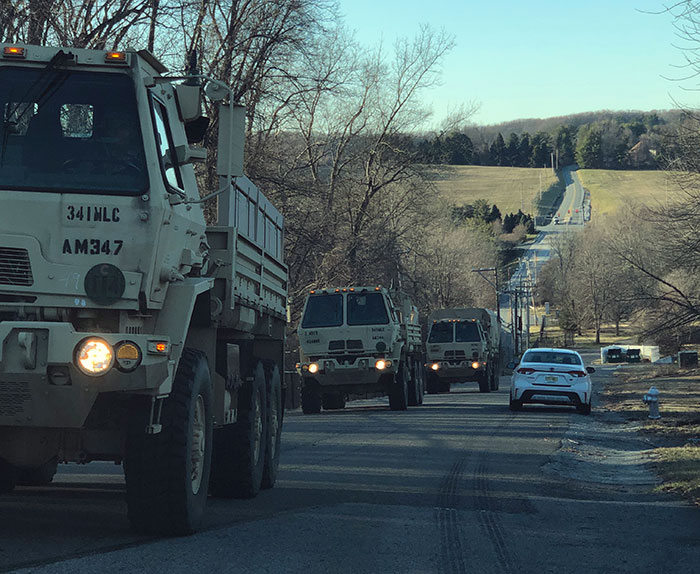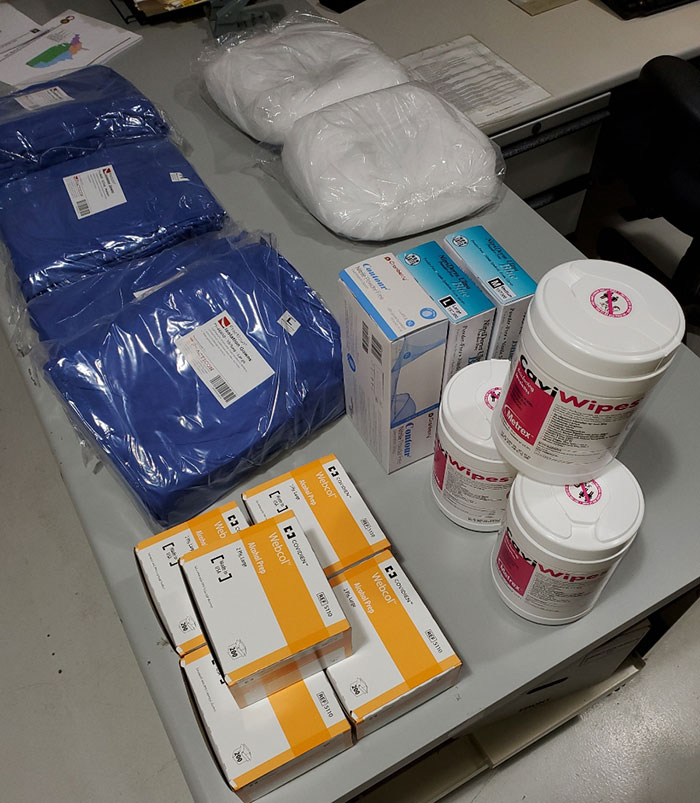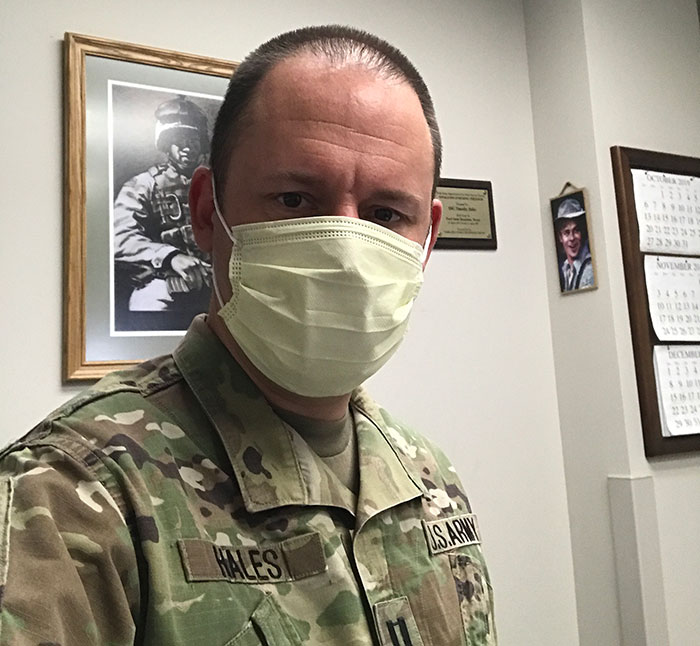Somewhere Between a Soldier and a Civilian

The U.S. Army Medical Materiel Development Activity at Fort Detrick, Maryland, is comprised of military, civilian and contractor personnel working together to fulfill the organization's mission to develop and deliver quality medical capabilities to our Warfighters throughout the world. Included among USAMMDA's staff are members of our nation's military reserve force, and one such member, Timothy Hales, was called up recently to active duty in support of our global response to the COVID-19 effort. Hales, a Department of the Army civilian who serves as assistant product manager for USAMMDA's Medical Modernization team in the Warfighter Deployed Medical Systems Project Management Office, was mobilized from March 19 through May 12, to assist with direct medical supply and maintenance support for all mobilized Urban Medical Task Force teams in the eastern United States.
"I was mobilized for about 60 days as the commander of the 341st Medical Logistics Company in Newtown Square, Pennsylvania," said Hales. "Under the 3rd Medical Command, five distinct urban augmentation medical task forces were mobilized to create teams of 85 personnel each to serve in the built hospitals within urban environments, including New York City and New Jersey."
"We were tasked with providing and ordering personal protective, cleaning and medical equipment, such as combat lifesaver bags, for the 15 teams that were activated," he continued. "We immediately took action and expanded our warehouse capacity – we ordered and filled these requests, resulting in more than $150,000 worth of much-needed equipment, and we also arranged the shipment of these items to the centers."

Now a captain, Hales has served in the U.S. Army Reserve for the past 18 years and was part of the Active Guard/Reserve program from 2012 through 2019. His steadfast commitment has sent him all across the country, with assignments in Tennessee, Maryland, Massachusetts, California and Pennsylvania. In July 2019, Hales returned to traditional reserve status and joined the WDMS PMO's Modernization team, primarily supporting the group's multi-year Hospital Center conversion project.
Given the passion Hales displays for both our nation and its military, his role at USAMMDA was a perfect fit for him. Clearly, he is dedicated to saving lives, wherever this may be. Therefore, when the COVID-19 pandemic arose earlier this year, Hales was well-suited for a frontline role in fighting the highly unusual, albeit dangerous threat.
"When I heard about the research being conducted on [the drug] remdesivir, and what the USAMRDC [U.S. Army Medical Research and Development Command] is doing in support of the effort, I felt such a sense of pride, and I thought, 'This is exactly why we do the things we do here at USAMMDA,'" said Hales. "I am so proud to be part of a team that truly is spearheading the campaign against the pandemic."
In directly supporting the frontline healthcare providers during this unprecedented time, Hales and his Soldiers worked diligently to ensure the stock and functionality of various types of medical equipment, including ventilators, which were in high demand. In addition, their company fielded the equipment orders for all of the brigades and all of the Urban Medical Task Force teams throughout the U.S. eastern seaboard.
"We were in direct contact with the division staff every day, completing orders and servicing our customers," explained Hales. "Because of this, the unit now supports more than 100 internal and external customers with medical logistics, compared to before the pandemic, when we had less than 20. Although this has created much more work for the unit's full-time staff, the situation has shed a positive light on our ability to respond quickly and efficiently in times of crisis."

Clearly, the effects of COVID-19 have been far-reaching, impacting the entire world in various degrees. From the national economy to our personal relationships with family and friends, normal life throughout the country was halted abruptly and indefinitely, which created a sense of uncertainty, and perhaps fear, for many. However, this unexpected health crisis actually helped to solidify Hales' commitment to his duty as both a Soldier and an American citizen. "It has been a tough situation for everyone across the country, because people are scared and it's difficult to know what risks we take when walking out the door," he said. "But from the moment I put on the Army uniform for the very first time, I knew that I was doing it for a higher calling. That was my goal – to make a difference, serve our country and the people that I love so much; to take pride in wearing that uniform, and most of all, to save lives."
As a DA civilian, Hales is also very dedicated to his work as a product manager for the WDMS PMO and realizes the importance of his group to the mission of USAMMDA. He believes their numerous projects will provide current and future Warfighters with the tools they need to be successful. "Our Medical Modernization team is utilizing new business practices to ensure things are done correctly, so that in 15 to 20 years, when the equipment must be modernized again, the Army will have a stable foundation to increase capabilities and engage disruptive technology to further advance care as far forward in the battle space as possible," said Hales.
While he admits maintaining an effective balance between being a Soldier and a civilian may be difficult at times, Hales says he would not have it any other way.
"People may not understand how hard it is to wear two hats," said Hales. "The key for me has been keeping a proper work-life balance, and understanding what is important versus what is urgent. Also, ensuring that I am engaged and present when I am with my family has been my number one concern, especially within our present scenario involving COVID-19."
"It truly requires mental compartmentalization on my part to ensure that I am fully present in these different functions throughout my daily life," he continued. "There is an inherent challenge in serving as a civilian product manager for USAMMDA while also serving as a military commander who can be called up at any time, for any given assignment. We will always have stress, and to-do lists, and multiple 'things' happening, but if you lean into this and realize that you are living for a purpose, life can be very rewarding."
USAMMDA is a subordinate command of the U.S. Army Medical Research and Development Command, under the Army Futures Command. As the premier developer of world-class military medical capabilities, USAMMDA is responsible for developing and delivering critical products designed to protect and preserve the lives of Warfighters across the globe. USAMRDC is leading research to prevent, detect and treat COVID-19. USAMMDA is applying existing field-leading research capabilities, a global research network and established partnerships to support the Whole-of-Government response to COVID-19.













